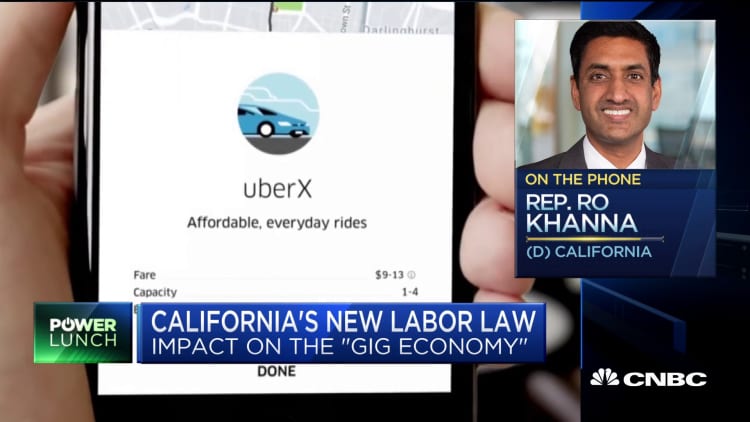
A lawsuit filed by Uber, Postmates and other parties against a forthcoming California law regulating gig-economy work makes a feeble case, U.S. Rep. Ro Khanna told CNBC on Tuesday.
"I think their argument is very weak," Khanna, the Democratic representative of California's 17th Congressional District, said in a "Power Lunch" interview. His district includes parts of the San Francisco Bay Area, where Uber, Postmates and other Silicon Valley technology firms are based.
On Monday, Uber and Postmates joined two contractors working for the transport apps in filing a suit alleging that the state of California's Assembly Bill 5 is unconstitutional. The law, signed by Democratic Gov. Gavin Newsom in September and set to go into effect Wednesday, will force the companies to reclassify gig workers as employees instead of contractors.
"The dispute is that the rewards of the technology revolution has gone to a very few," Khanna said, adding that state lawmakers want to "distribute [the profits]. Let's make sure that everyone working in this new economy is benefiting, not just the very top."
The lawsuit filed in the U.S. District Court for Central California claims that AB 5 was "designed to target and stifle workers and companies in the on-demand economy." It also argues there are "nonsensical" exemptions for other contractor roles, such as "direct salespeople, travel agents, grant writers, construction truck drivers, commercial fisherman," among others.
The law does, however, affect workers outside the gig economy, which is where people typically turn to find flexible and non-traditional jobs as independent contractors and freelancers. AB 5 includes freelance writers and other types of contractors. Vox Media said it would cut freelancers in California because of the bill.
Being that drivers are independent contractors, they are not entitled to benefits, such as paid time off, overtime or health insurance, that companies typically offer to full-time employees. Uber, which has become a tough competitor to the taxi industry especially in cities such as New York, lists 3.9 million drivers as independent contractors.
Some of those drivers, including rival Lyft contractors, have recently protested against low pay and working conditions.
In a statement provided to CNBC, Postmates said the lawsuit is intended to "preserve on-demand work opportunities." The food delivery service company says it is advocating that industry and labor leaders and lawmakers "modernize a robust safety net" that includes portable benefits, earnings above the minimum wage and adequate flexibility.
In August, Uber, Lyft and DoorDash bankrolled $90 million for a California ballot initiative to create an alternative model.
When asked if there could have been a private-market solution to address the labor practices of Uber and Postmates, Khanna said the bill gives the independent contractors the chance to unionize.
"This bill is saying that if you work in the gig economy you should have the right to unionize and the right to bargain for fair wages," he said.
"This law is necessary so that drivers can have some benefit of the gig economy. I mean you have Uber that's worth $50 billion," Khanna argued. "What this law is saying is when you have a company that's as profitable as Uber, in terms of their market value, then make sure that the people doing the work, the drivers, are benefiting as well."
Representatives of Uber did not immediately respond to CNBC's requests for comment.


